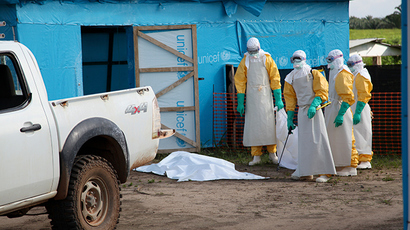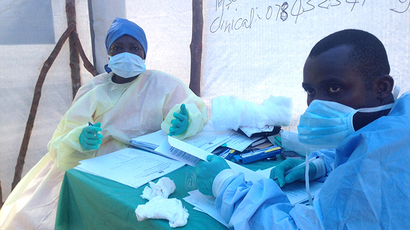Intl health emergency: WHO issues Ebola warning
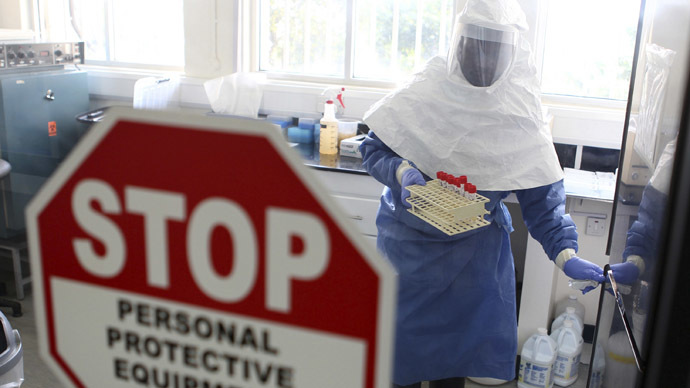
The Ebola outbreak in West Africa is an "extraordinary event", which poses a public health risk to other states, the World Health Organization said, urging global coordinated response to the disease.
The health body described the consequences of a further international spread of the virus as “particularly serious” due to its virulence.
“A coordinated international response is deemed essential to stop and reverse the international spread of Ebola,” the WHO said in a statement after a two-day meeting of its emergency committee on Ebola.
#Ebola in West #Africa: The possible consequences of further intl spread are particularly serious - WHO Emergency Committee
— WHO (@WHO) August 8, 2014
WHO announced an international health emergency over Ebola, calling the current outbreak the most severe since 1976, when the virus was first identified in humans.
The organization previously declared similar emergencies for the swine flu pandemic in 2009 and for polio this May.
The declaration of an international emergency is aimed at increasing the level of vigilance for transmission of the virus.
All states with Ebola transmission – Guinea, Liberia, Nigeria and Sierra Leone – should declare a national emergency, WHO said, adding that the outbreak shouldn’t prevent international trade and travel.
"Countries affected to date simply do not have the capacity to manage an outbreak of this size and complexity on their own," Dr. Margaret Chan, WHO chief, said at a news conference in Geneva. "I urge the international community to provide this support on the most urgent basis possible."
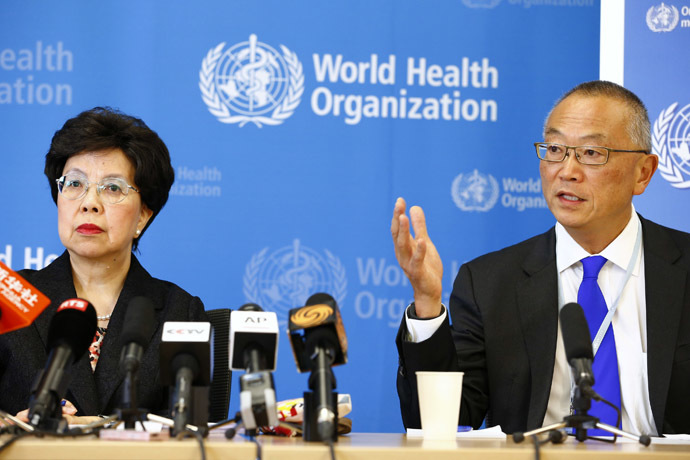
The spread of Ebola could be stopped if infected people are dealt with properly, Keiji Fukuda, WHO’s head of health security, said.
"This is not a mysterious disease. This is an infectious disease that can be contained," he stressed. "It is not a virus that is spread through the air."
The organization explained the rapid spreading of the virus by the weaknesses of the health systems of the affected states in West Africa.
The inexperience of local medics and misperception of the Ebola virus “continue to be a major challenge in some communities,” the health body added.
Global alarm over the spread of the disease increased in July when an American citizen died in Nigeria after traveling there by plane from Liberia.
The current outbreak of Ebola, which began in Guinea in March and spread to Sierra Leone and Liberia, has already claimed nearly 1,000 lives.
#Ebola: As of 4 Aug 2014, countries have reported 1,711 cases (1,070 conf, 436 probable, 205 susp), incl 932 deaths
— WHO (@WHO) August 8, 2014
US lifts hold on experimental Ebola drug
The US health authorities have eased safety restrictions on an experimental Ebola drug, which could clear the way for its use to treat patients infected with the deadly virus.
Tekmira Pharmaceuticals announced on Thursday that it has received “verbal confirmation” from US Food and Drug Administration (FDA) that the full clinical hold on its TKM-Ebola drug has been modified to a partial clinical hold.
“We’re pleased that the FDA has considered the risk-reward of TKM-Ebola for infected patients,” Dr. Mark Murray, Tekmira’s CEO, stressed. “We have been closely watching the Ebola virus outbreak and its consequences, and we are willing to assist with any responsible use of TKM-Ebola.”
The drug developed by the Canadian company, which has a $140-million deal with the US government, has shown ability to block high doses of the Ebola virus in monkey studies.
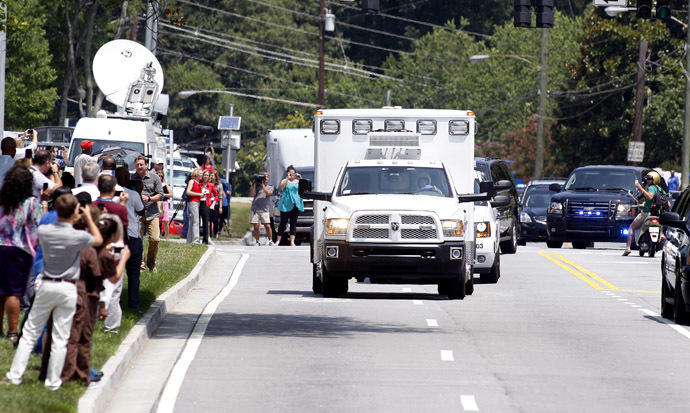
However, Tekmira had to stop its research on July 21 after small dosing study in 28 healthy adults revealed problematic immune responses among some of the subjects.
Previously, a source within the FDA told Reuters that the partial hold would allow the company to launch a new study in sick patients, for whom any safety risks from the treatment would be mitigated by the prospect of dying.
"The benefit-risk ratio changes completely," the source said. “Anything that would shift the risk-benefit to a more favorable outcome could potentially allow the authorization of that study.”
Earlier this week, another experimental drug was given to two American aid workers who contracted Ebola in Liberia, with the patients showing signs of improvement.
Unlike TKM-Ebola, which targets the genetic material of Ebola, ZMapp drug, developed by Mapp Biopharmaceutical of the US, is aimed at boosting the immune system’s efforts to tackle the virus.
Experimental drugs that haven’t yet proven to be safe or effective are given the green light due to a massive Ebola outbreak in West Africa.
However, the director of the US Centers for Disease Control and Prevention, Dr. Tom Frieden, said that the actual death toll may exceed the WHO’s stats as many cases may remain unreported.
“The data coming out is kind of a fog-of-war situation,” Frieden is cited as saying by AP.
The health official warned the congressional committee on Thursday that current Ebola crisis in West Africa can sicken more people than all other previous outbreaks of the disease combined.
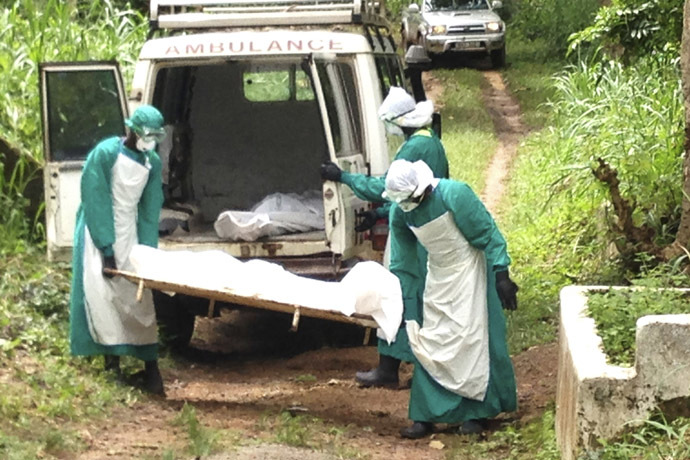
"It will be a long and hard fight" because in a best-case scenario it would take at least three to six months to end the outbreak, Frieden stressed.
The virus is spreading rapidly due to lack of infection control, with families taking care of their sick relatives together with the health workers, and risky burial practices, he added.
Meanwhile, the US has ordered families of its diplomats to in Liberia, warning against non-essential travel to the West African state.
The US is also sending extra staff to Liberia in the fight against Ebola, which includes 12 disease prevention specialists from the Centers for Disease Control and Prevention and a 13-member disaster assistance response team from USAID.
Ebola virus disease is a severe disease, with a fatality rate of up to 90 percent, according to the WHO.













